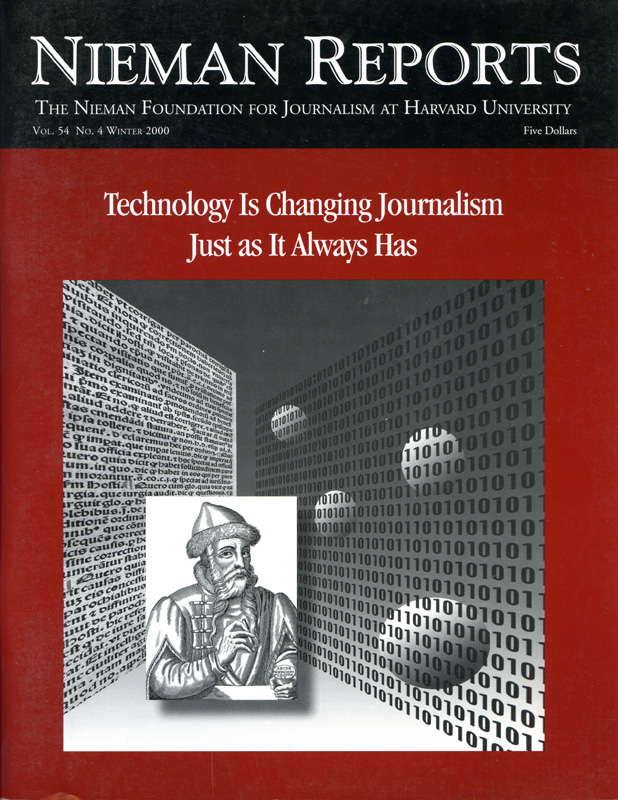
Technology Is Changing Journalism Just as It Always Has
Our journey into the digital future begins with an essay by Tom Regan, associate editor of The Christian Science Monitor’s Web site. His advice: Remember that technology is changing journalism, “as it always has;” wireless is the next publishing realm, and the Web—as a news distribution method—is (almost) already dead.
… A number of Web sites now make it very easy for activists to create e-mail campaigns quickly and Web petitions for little or no money. And many of these RELATED ARTICLE
"Interactivity—Via E-Mail—Is Just What Journalism Needs"
- Tom Regansites are optimized for quick-starts on late-breaking issues, making them ideal for instant controversies like the impeachment of a president, the deportation of Elian Gonzalez, or a contested presidential election.
The wide circulation of “media lists,” with personal e-mail addresses of prominent newspaper editors and television news directors, has extended the edges of the revolution directly into the media’s e-mail in-boxes.
Michael Cooke, editor in chief of the Chicago Sun-Times, has watched the number of e-mails he receives “balloon” since shortly after Election Day. On Monday, he received about 1,450 emails, most of them urging him to oppose any “re-votes” in Florida. At least that’s what Cooke said, based on some sampling.
“Basically, I just delete them,” he said. “I scroll through the list looking for my boss’s name. If I don’t see his name in the ‘from’ box, I don’t even look at it.
“This is the first time I’ve been spammed like this, and it’s annoying. Now instead of going out to lunch, I just sit there deleting e-mails.”
The [Boston] Globe’s editor, Matthew V. Storin, reports a similar deluge. Between Friday afternoon and Monday evening, he received 2,193 emails, the vast majority related to the voting in Florida. Later, he gave an update: Between 11 p.m. Monday and 10:40 a.m. yesterday he received 310 emails.…
"Interactivity—Via E-Mail—Is Just What Journalism Needs"
- Tom Regansites are optimized for quick-starts on late-breaking issues, making them ideal for instant controversies like the impeachment of a president, the deportation of Elian Gonzalez, or a contested presidential election.
The wide circulation of “media lists,” with personal e-mail addresses of prominent newspaper editors and television news directors, has extended the edges of the revolution directly into the media’s e-mail in-boxes.
Michael Cooke, editor in chief of the Chicago Sun-Times, has watched the number of e-mails he receives “balloon” since shortly after Election Day. On Monday, he received about 1,450 emails, most of them urging him to oppose any “re-votes” in Florida. At least that’s what Cooke said, based on some sampling.
“Basically, I just delete them,” he said. “I scroll through the list looking for my boss’s name. If I don’t see his name in the ‘from’ box, I don’t even look at it.
“This is the first time I’ve been spammed like this, and it’s annoying. Now instead of going out to lunch, I just sit there deleting e-mails.”
The [Boston] Globe’s editor, Matthew V. Storin, reports a similar deluge. Between Friday afternoon and Monday evening, he received 2,193 emails, the vast majority related to the voting in Florida. Later, he gave an update: Between 11 p.m. Monday and 10:40 a.m. yesterday he received 310 emails.…


